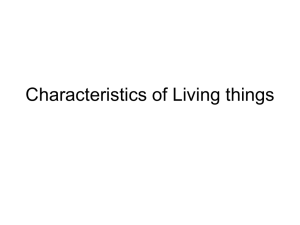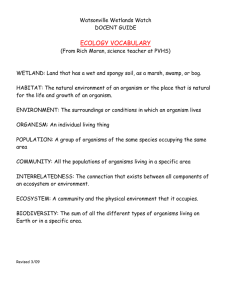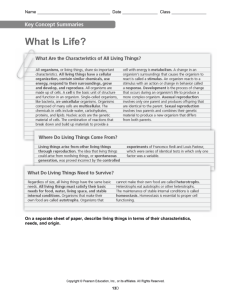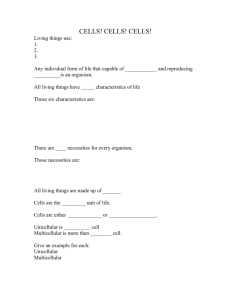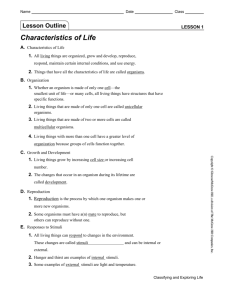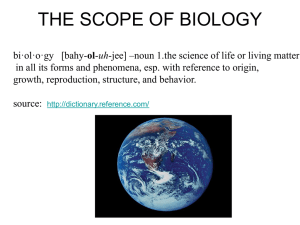Vocabulary Review - Biology Junction
advertisement
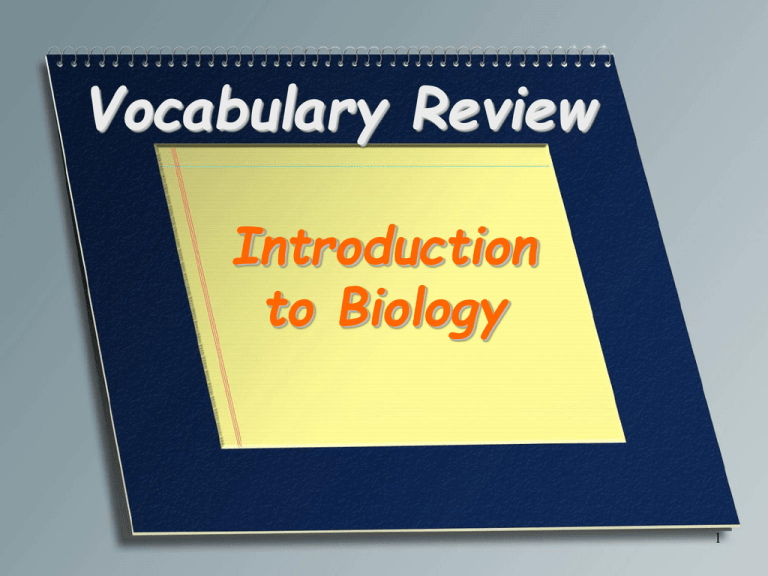
Vocabulary Review Introduction to Biology 1 Study of life BIOLOGY 2 High degree of internal & external order in living things ORGANIZATION 3 Composed of only one cell UNICELLULAR 4 Composed of more than one cell MULTICELLULAR 5 Smallest unit of life CELL 6 Group of specialized cells working together TISSUE 7 Tissues working together to do a job such as the heart or lungs ORGANS 8 Tiny structures inside a cell that do different jobs ORGANELLES 9 Chemical compounds that make up organelles BIOLOGICAL MOLECULES 10 An individual living thing ORGANISM 11 A physical or chemical change in the environment an organism can respond to STIMULUS 12 The response of the pupils of the eye when shown a bright light DILATION 13 Stable internal conditions of an organism HOMEOSTASIS 14 What would happen to an organism that didn’t maintain homeostasis DEATH 15 Required by all living things to power their life processes ENERGY 16 Sum of all the chemical reactions in an organism METABOLISM 17 Process of capturing and storing light energy in the bonds of sugars PHOTOSYNTHESIS 18 Increase in size of an organism GROWTH 19 Formation of new cells from existing cells CELL DIVISION 20 The main change that follows cell division in a unicellular organism ENLARGEMENT 21 Process by which an organism becomes a mature adult DEVELOPMENT 22 Cells specializing by taking on different shapes and functions DIFFERENTIATION 23 Organisms producing new organisms like themselves REPRODUCTION 24 Reproduction of organisms must occur for this to be true for a species SURVIVAL 25 Large molecule containing the hereditary information of a cell DNA 26 Instructions for a single trait on DNA GENE 27 Reproduction that recombines hereditary information from two organisms SEXUAL 28 Reproduction where the new individual is genetically identical to the original ASEXUAL 29 The ability of a population of organisms to change over long periods of time EVOLUTION 30 The variety of life that exists DIVERSITY 31 Three major divisions of all life DOMAINS 32 Animalia, Plantae, and Fungi are examples KINGDOMS 33 Organisms interacting with each other and their environment ECOLOGY 34 Communities of living organisms and their physical environment ECOSYSTEM 35 Main byproduct of animals that is used by plants CARBON DIOXIDE 36 Descent with modification EVOLUTION 37 Theory that organisms with favorable traits are better able to survive NATURAL SELECTION 38 Traits that improve an individual’s ability to survive and reproduce ADAPTATIONS 39 An organized approach used by scientists to learn how the natural world works SCIENTIFIC METHOD 40 The act of perceiving the natural world OBSERVATION 41 Formed from observations to propose an explanation for the way things work in the natural world HYPOTHESIS 42 Test of a hypothesis EXPERIMENT 43 Information gathered in an experiment DATA 44 Provides a standard for comparison in an experiment CONTROL 45 The one thing that a scientist allows to change in an experiment VARIABLE 46 Highly tested, generally accepted principle that explains several observations THEORY 47 Scientific experts who critique another scientist’s work PEER REVIEW 48 49

